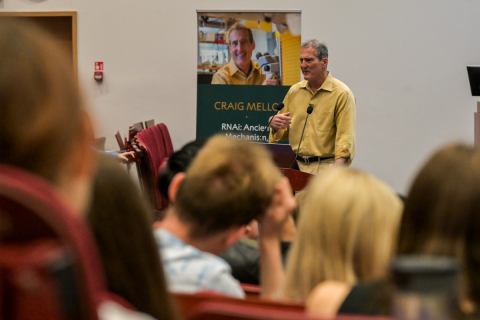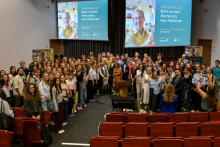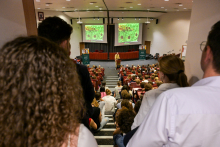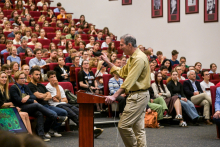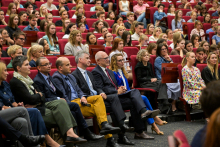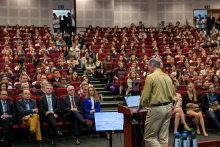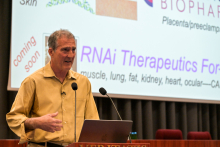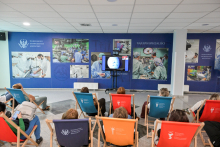Professor Craig Cameron Mello, recipient of the Nobel Prize in Physiology or Medicine in 2006 for the discovery of RNA interference, began his lecture with a description of genome evolution. He discussed experiments conducted on Caenorhabditis elegans, nematodes that led to a groundbreaking discovery: the specific silencing of gene expression through double-stranded RNA (dsRNA).
Simplicity of the Nobel-winning experiment
Professor Mello emphasized the simplicity of the experiment which earned him the Nobel Prize. He encouraged young researchers not to shy away from the simplest and most obvious solutions – those often overlooked by others. He advocated open-mindedness and breaking away from stereotypes. He spoke of human curiosity as a constant driver of scientific progress and stressed that without a passion for science, pursuing a scientific career is meaningless. He pointed out the importance of failure in research, seeing it as a valuable source of insight and inspiration.
From award to practical application
The Nobel Laureate also described the challenging path from receiving the prize to the development and implementation of life-saving medications, his collaboration with the pharmaceutical industry, and clinical trials. He expressed gratitude to the many collaborators without whom his discovery would not have found practical application.
In addition to delivering the lecture, Professor Craig Cameron Mello met with representatives of the MUW Student Government and Scientific Clubs, as well as doctoral students from the MUW Doctoral School. He also held discussions with the University’s authorities.
A discovery that opened new pathways in research
According to MUW Rector, Professor Rafał Krenke, the discovery of RNA interference (RNAi), a mechanism regulating gene expression, was a breakthrough for medicine:
“The pioneering research of Craig Mello and Andrew Fire demonstrated that double-stranded RNA can silence specific genes, effectively switching them off. This discovery not only changed our understanding of molecular biology but also opened entirely new directions in biomedical research, diagnostics, and therapy.
RNA interference has since become an essential tool in studying gene function and laid the foundation for the development of new treatments for genetic diseases, viral infections, and even cancer. Professor Mello’s achievements are a prime example of how fundamental scientific research can lead to major advances in medicine.”
Craig Cameron Mello is a professor of molecular medicine at the University of Massachusetts Medical School. The research that earned him the Nobel Prize –conducted together with Andrew Z. Fire – was conducted at the Carnegie Institution of Washington and published in 1998. In awarding the prize, the Karolinska Institute emphasized that the researchers “discovered a fundamental mechanism for controlling the flow of genetic information.”
The main organizer of Craig C. Mello’s visit to Warsaw is Nobel Prize Outreach as part of the Nobel Prize Inspiration Initiative, in collaboration with AstraZeneca. This international program enables Nobel Laureates to share inspiring stories and insights with the academic community, particularly with young researchers and students.
